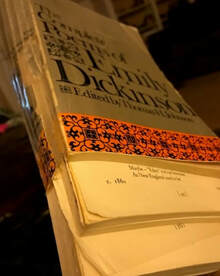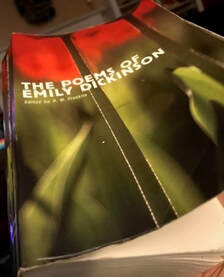Recently I came across an Oscar Wilde quote on Twitter about a poet’s ability to survive everything “but a misprint.” On the same day I came across a misprint within an online version of a poem by Emily Dickinson. I wrote about it HERE.
In that post I also mentioned some of the differences between the Johnson and the Franklin editions of Dickinson’s poetry.
My (now-ragged) copy of “The Complete Poems of Emily Dickinson” edited by Thomas H. Johnson was published in 1960, and the introduction to the book states, “The text for this edition…reproduces solely and completely that of the 1955 variorum edition, but intended as a reading text, it selects but one form of each poem.” It further notes, “The order of the poems is that the Harvard (variorum) edition.”
My (close-to-ragged) copy of “The Poems of Emily Dickinson” edited by R. W. Franklin was published in 1998, and the introduction to this volume states, “About three fourths of the poems exist in a single source. For the rest, with from two to seven sources, the policy has been to choose the latest version of the entire poem, thereby giving to the poet, rather than the editor, the ownership of change.”
Franklin also noted, “With Dickinson’s practice in her manuscripts as the standard for representing her poem, this volume follows her spelling, capitalization punctuation and usage.” Johnson, in his 1955 volume, stated “I have silently corrected obvious misspelling…and misplaced apostrophes. Punctuation and capitalization remain unaltered….Capitalization, though often capricious, is likewise untouched.”
Below left: My Johnson edition of Dickinson's poetry is falling apart -- and the cover is taped together with scotch tape. Below right: My Franklin edition is in better shape -- but it won't be too much longer until I need a new one. : )
So how similar – or different – are the two volumes?
ORDER
In some instances, poems are very close to the same order in both books. For example, poems J-119 (Talk with prudence to a Beggar), J-120 (If this is “fading”), and J-121 (A Watchers hang opon the East) in the Johnson edition, are numbers F-118, F-119, and F-120 in the Franklin edition.
In other cases, though, poems are significantly distant in their order. For example, F-56 (I’ve got an arrow here) is toward the end of the Johnson edition, numbered J-1729.
IDENTICAL POEMS (or those with very minor differences)
In some cases, poems in both the Johnson and the Franklin editions are exactly the same. For example, poems J-381 and F-643 (A Secret told) are identical in every way. In other cases, differences can be as minor as a single capital letter. For example, with J-435 and F-620 (Much Madness is divinest Sense), the only difference appears in the fifth line of the poem, “In this, as all, prevail.” The Johnson version includes a capital “A” with the word “All,” while the Franklin edition has a lower case “a.”
POEMS WITH INTERESTING DIFFERENCES
Some poems in the two editions have more intriguing differences – more than just a capital letter, an altered spelling, or a shifted punctuation mark. I think one of the more intriguing – but subtle differences – occurs in J-341/F-372 (After great pain, a formal feeling comes). The second stanza of the poem in the Johnson edition reads as follows:
The Feet, mechanical, go round –
Of Ground, or Air, or Ought –
A Wooden way
Regardless grown,
A Quartz contentment, like a stone –
Note the slight – or significant? – change in the second and third lines of the second stanza in the Franklin edition:
The Feet, mechanical, go round –
A Wooden way
Of Ground, or Air, or Ought –
Regardless grown,
A Quartz contentment, like a stone –
Does the change make any difference?
A similar change in a piece of music would be undeniably significant. Take Beethoven’s Fifth Symphony – what if the third and fourth measures were flipped with the first and second?
POEMS WITH SIGNIFICANT DIFFERENCES
When comparing Dickinson’s poems in the Johnson and Franklin editions, occasionally poems with the same first line are significantly different. Take F-291 and J-311, “It sifts from Leaden Sieves”:
| J-311 It sifts from Leaden Sieves – It powders all the Wood. It fills with Alabaster Wool The Wrinkles of the Road – It makes an Even Face Of Mountain, and of Plain – Unbroken Forehead from the East Unto the East again – It reaches to the Fence – It wraps it Rail by Rail Till it is lost in Fleeces – It deals Celestial Vail To Stump, and Stack – and Stem – A Summer's empty Room – Acres of Joints, where Harvests were, Recordless, but for them – It Ruffles Wrists of Posts As Ankles of a Queen – Then still its Artisans – like Ghosts – Denying they have been – | F-291: It sifts from Leaden Sieves – It powders all the Wood – It fills with Alabaster Wool The Wrinkles of the Road – It scatters like the Birds – Condenses like a Flock – Like Juggler's Figures situates Upon a baseless Arc – It traverses yet halts – Disperses as it stays – Then curls itself in Capricorn – Denying that it was – |
More differences coming soon – including poems in Franklin's edition that are NOT in Johnson's "The COMPLETE Poems of Emily Dickinson." Stay tuned!



 RSS Feed
RSS Feed
